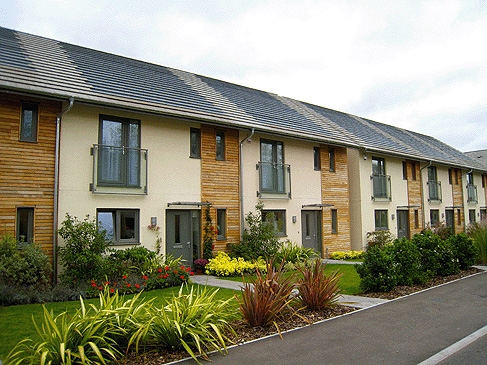The UK will not meet its legally binding climate change targets unless emissions of greenhouse gases from UK buildings are almost completely eliminated, and in its report “UK housing: fit for the future?” the Committee on Climate Change (CCC) warns that emission reduction from the UK’s 29 million homes has stalled, while energy use – which accounts for 14% of total emissions – increased between 2016 and 2017. The report sets out five priority areas where the committee believes that government action may help.

While technology exists to create high-quality, low-carbon and resilient homes, the report states, current policies and standards are not driving the scale and pace of change needed to ensure that homes are effective refugees from the damaging effects that climate change is predicted to cause, such as extreme temperatures, unpredictable weather and increased risk of flooding.
The CCC is an independent, statutory body established under the 2008 Climate Change Act. Comprised of experts in climate science, economics, behavioural science and business, it is chaired by former environment secretary Lord Deben and is sponsored by the Department of Business Energy and Industrial Strategy, the Northern Ireland executive, Scottish Government and Welsh Government. Its remit includes advice both on reducing emissions and thus transitioning to a low-carbon future, and on improving resilience to climate change, where it also advises other countries.
The report identifies several issues that have led to the slackening of pace in improving the climate change performance of housing stock. Home insulation installations have stalled, it says; policies such as the “zero carbon homes” scheme have been weakened or withdrawn; policies to encourage flood protection and improve water efficiency are too weak; building standards are inadequate; and local authorities are not addressing the issue.
The five areas where government could help include inspection and enforcement of building standards to ensure that new homes and retrofitting of environmental improvements to existing homes meet design standards; a national training programme to close the skills gap in housing design, construction and installation of new technologies; Treasury support for retrofitting to existing homes measures and equipment such as heat pumps and heat networks, insulation, improved shading and ventilation, indoor moisture reduction, improved air quality and water efficiency and where necessary, flood protection; enforcement of environmental specifications and new homes, including low-carbon heating, increased use of timber frames and no connection to the gas grid for new homes from 2025 at the latest; addressing of funding gaps for low carbon heating sources beyond 2021 and better resources for building control departments in local authorities. Measures such as preferential mortgage rates for owners of energy efficient and low-carbon homes and “Green loans” to cover the cost of sustainability improvements should be considered, it adds.
“This report confirms what we have long-suspected: UK homes are largely unprepared for climate change,” said Baroness Brown, who chairs the CCC’s Adaptation Committee and was previously a senior engineer at Rolls-Royce, principal of the engineering faculty at Imperial College London and Vice-Chancellor of Aston University. “The Government now has an opportunity to act. There must be compliance with stated building designs and standards. We need housing with low-carbon sources of heating. And we must finally grasp the challenge of improving our poor levels of home energy efficiency. As the climate continues to change, our homes are becoming increasingly uncomfortable and unsafe.” Work has scarcely begun on improving homes, she added, and issues of finance, funding and training are particularly key to making UK homes climate-ready.
Lord Deben, a former environment secretary, added: “Simply put, there is no way in which the UK can meet the legally-binding climate change targets that Parliament has determined unless we take the measures outlined in this report.”




Glasgow trial explores AR cues for autonomous road safety
They've ploughed into a few vulnerable road users in the past. Making that less likely will make it spectacularly easy to stop the traffic for...